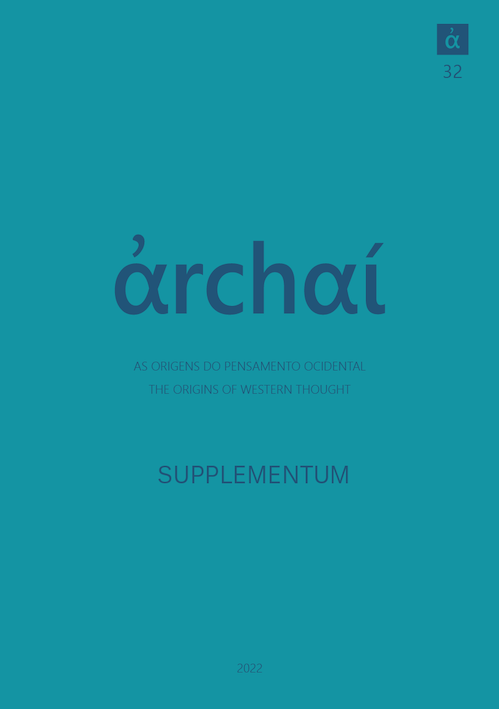Introduction to Studies on Plato’s Lysis
DOI:
https://doi.org/10.14195/1984-249X_32_36Keywords:
Lysis, Plato, Studies, Archai, supplementumAbstract
Plato’s Lysis shows Socrates in conversation with two boys he has met at a wrestling school, Lysis and Menexenus. Their debate revolves around the notion of philia, seeking to pin down the nature of this relation, who or what takes part in it, and what causes it. The word philiahas usually been translated as “friendship” but has a wider application in this dialogue, as it encompasses a variety of friendly and loving attitudes toward both people and things. The kinds of interpersonal philia evoked include erotic attachments, kinship relations, utility-based relations, and playful companionship. Roughly two-thirds into the dialogue, the focus turns to a more general theory of desiderative attachments and the question of their ultimate telos and cause. The conversation ends, at least on the face of it, in an impasse, an aporia, when the interlocutors find themselves thrown back to the point from where they started, and no attempt to answer the question of what philia is or what motivates it has stuck. The Lysis nevertheless offers many incentives for further discussion and has elicited radically different responses from its interpreters as to what its real message is. For instance, does it promote a form of utilitarian egoism according to which human attachment can never, or should never, be altruistically motivated? Or does it hint at a very different concept of interpersonal love based on the idea that friendship, as it were, completes us since it connects us with those that share the same values? Does this dialogue stay within the familiar ambit of Socratic ethics, centered around the question of what it takes to achieve happiness (eudaimonia) in a human life, without a concern for metaphysical questions? Or, quite the contrary, does its discussion of the highest object of love (to proton philon) point forward to the metaphysical program of Plato’s so-called middle-period dialogues and especially to the notions of the form of the good or the form of the beautiful, notions which are at the center of the Republic and the Symposium? These questions and others will continue to be debated about this puzzling dialogue. The essays assembled in the present volume address many of these topics.
Downloads
References
COMSTROCK, R.; ANDERSON, T. (2022). “Cutting them down to size: Humbling and protreptic in Plato’s Lysis In: JENNINGS, D.; SZAIF, J. (eds.), Studies on Plato’s Lysis, special issue of Archai 32, suppl. 1.
DERETIC, I. (2022). Egoism, Utility, and Friendship in Plato’s Lysis In: JENNINGS, D.; SZAIF, J. (eds.), Studies on Plato’s Lysis, special issue of Archai 32, suppl. 1.
JENNINGS, D. (2022). The akin vs. the good in Plato’s Lysis. In: JENNINGS, D.; SZAIF, J. (eds.), Studies on Plato’s Lysis, special issue of Archai 32, suppl. 1.
JENNINGS, D.; SZAIF, J. (eds.) (2022), Studies on Plato’s Lysis, special issue of Archai , 32, suppl. 1.
PAYNE, A. (2022). Philia as Fellowship in Plato’s Lysis In: JENNINGS, D.; SZAIF, J. (eds.), Studies on Plato’s Lysis, special issue of Archai 32, suppl. 1.
ROOCHNIK, D. (2022). Plato’s Lysis and the Erotics of Philia In: JENNINGS, D.; SZAIF, J. (eds.), Studies on Plato’s Lysis, special issue of Archai 32, suppl. 1.
SZAIF, J. (2022). Aporetic Discourse and Protreptic in Plato’s Lysis In: JENNINGS, D.; SZAIF, J. (eds.), Studies on Plato’s Lysis, special issue of Archai 32, suppl. 1.
Downloads
Published
How to Cite
Issue
Section
License
Copyright (c) 2023 Jan Szaif, David Jennings

This work is licensed under a Creative Commons Attribution 4.0 International License.
Given the public access policy of the journal, the use of the published texts is free, with the obligation of recognizing the original authorship and the first publication in this journal. The authors of the published contributions are entirely and exclusively responsible for their contents.
1. The authors authorize the publication of the article in this journal.
2. The authors guarantee that the contribution is original, and take full responsibility for its content in case of impugnation by third parties.
3. The authors guarantee that the contribution is not under evaluation in another journal.
4. The authors keep the copyright and convey to the journal the right of first publication, the work being licensed under a Creative Commons Attribution License-BY.
5. The authors are allowed and stimulated to publicize and distribute their work on-line after the publication in the journal.
6. The authors of the approved works authorize the journal to distribute their content, after publication, for reproduction in content indexes, virtual libraries and similars.
7. The editors reserve the right to make adjustments to the text and to adequate the article to the editorial rules of the journal.



